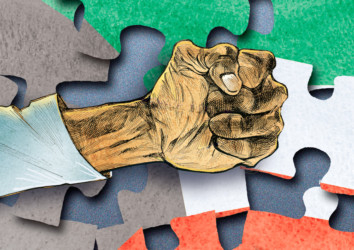
As tension between Kuwait’s government and young demonstrators has increased over the past three years, the question as to what is driving the youth to take to the streets has became an urgent one. Established political figures have designated themselves official spokespersons for Kuwait’s youngsters and a government-authorised committee — whose aim was to find out, and presumably resolve, the problems faced by young people — was convened in early 2012. The National Youth Project published its findings with a lavish celebration almost a year after its inception — a year in which Kuwait’s democratic status and the relationship between its leadership and the opposition took a dramatic and disturbing turn. Many Kuwaiti youth were prosecuted, fined and imprisoned in the process.
The findings highlighted many concerns that weighed heavily on young people’s minds such as ensuring an independent judiciary, fostering national unity and national security. All three concerns will continue to dominate the political agenda as the government struggles to placate angry young men and women desperate for inclusion. The troubling trend of increasing violence and a pervasive willingness to join demonstrations, highlight how Kuwait’s government has failed to offer bored and restless young people a sense of order, identity and belonging — a failure that will be exploited by politicians who know how to appeal to this neglected lot. Behind the unrest — following the Emir’s issuance of an emergency decree, changing the voting system, and opposition demands for an elected prime minister — was a youth base that was sick of corruption and the long wait for government-assisted housing.
The problem with focusing on issues related to the present crisis is that this fails to address the main culprits in radicalising Kuwait’s youth in the first place, starting with a public education system that discourages critical thinking and this is unable to provide the globally competitive edge necessary for today’s labour market. For many years, liberal academics and MPs warned the government that Islamist groups were hijacking the education system and watering down analytical curriculums in favour of biased, prejudiced and pseudo-religious texts. The trend of politicising the educational process also involved certain MPs who were interfering with the recruitment process for teachers and creating pressure groups to lower the admissions criteria for colleges. This was coupled with an entitlement culture that encouraged politicians to secure government jobs for their districts irrespective of merit or qualifications, pushing Kuwait into a structural unemployment cycle that would be hard to break in the foreseeable future.
Other factors contributing to youth engagement in protests include the lack of a spontaneous social environment and organised youth activities and a misplaced sense of national identity. The majority of Kuwaiti youth spend their free time in malls or at various eateries; angry political activism is marketed to people as a noble cause to replace this lack of momentum. A thriving communal sport scene became defunct as rivalries between ruling and merchant elites over leadership of local athletic clubs dragged politics into the realm of sports. Kuwait’s arts scene, which once led the GCC in terms of creative output and originality, got stifled by excessive censorship and a lack of funding. This gaping hole in extra-curricular activities and the shaping of identity was filled in by organised Islamist youth groups such as Jamiyat Al Isslah and Bayader Al Salam, which would host after-school activities, sports events and community-oriented classes.
A controversial planning decision in the early 1980s allowed government-allocated housing to morph into ethnic ghettos dominated by members of a single tribe, eliminating the natural neighbourly interaction with other segments of Kuwaiti society. In each residential area, young people would gain their sense of belonging from the local mosque, Hussainiah or tribal Diwanniya, reinforcing a tribal, ethnic or sectarian belonging that preceded the modern nation-state. The end result was a youth population more used to putting its faith in locally-elected politicians than in a wider representative government despite Kuwait’s generous subsidy programme. Saud Al Inizi, president of Kuwait’s Graduate Society, describes this national identity crisis as an inevitable result of the government’s focus not being “on state-building and presenting citizens with a set of common, law-driven values they can associate with.”
This combination of boredom, lack of direction and social isolation made Kuwaiti youth a fertile ground for protest movements when the Arab Spring’s domino effect made its way eastwards from North Africa. Kuwait’s fairly open political system and diverse media outlets fuelled many aspects of the political debate, not always in ways that fostered national unity, and so, peaceful protests turned into open defiance, inviting an unprecedented governmental crackdown.
The early indoctrination of Kuwait’s youth in Islamist social clubs and ethno-tribal groupings meant that there was always going to be a sympathetic, engaged and disciplined group of young people ready for mobilisation whenever the Muslim Brotherhood’s political arm, the Islamic Constitutional Movement (ICM), or tribal heroes such as Musallam Al Barrak, the controversial representative of the Muttairi tribe, descended on to the political arena. The demise of moderate nationalist parties and the lack of charismatic young leaders in liberal groups add to the sense of chaos and polarisation. What Kuwait needs today are effective solutions to the problem of political mobilisation among its youth and faster, more credible ways of implementation, to avoid an irreparable disconnect between its leadership and the young people who constitute more than two thirds of the population. The rebranding of the Public Authority for Youth and Sports and an overhaul of the Ministry of Education must be the priority.
Alanoud Al Sharekh is a senior fellow for regional politics at the International Institute for Strategic Studies. Follow her on Twitter at www.twitter.com/@AAlsharekh








